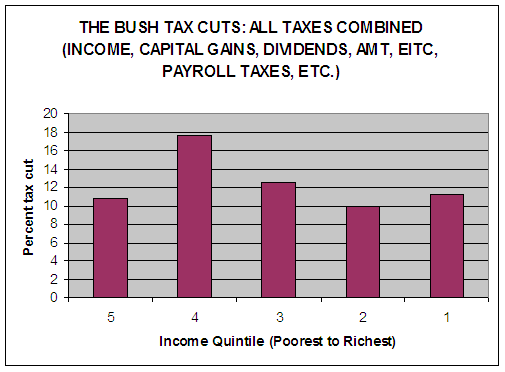[quote=“fred smith”]Our Iraq and Afghanistan commitments make up about 1.5 percent of the total budget AND this involves a lot of shifting from costs formerly incurred from keeping two aircraft carriers in the region and maintaining the no-fly zones over Iraq (US$36 billion per year). So, I would say this is not the problem. The problem is social programs and here I would scream along with you. We did not elect Bush to spend more on failed educational programs to curry favor with Teddy Kennedy. Cut, cut Cut!
Everyone knows we need social security reform. Bush tried to step up to the plate to discuss it but … we saw how that worked. What are we going to do? Wait until we are Germany or France to deal with this?[/quote]
Can’t agree with the overall thrust of this. The politics aside, a fiscally responsible administration would have cut expenditure first, then reduce tax (or introduce both simultaneously in a revenue neutral package, whatever). Instead we have a ‘starve the beast’ strategy which has clocked-up about 4 trillion in debt so far. It doesn’t make sense according to any standard economic criteria.
It could be argued that front-ending the tax cuts was justifiable in light of the 2001 recession. This doesn’t fit the character of most of the tax cuts. Getting rid of the estate tax, for example, was simply a handout to the rich. What do the rich do in a recession when their income/wealth increases? They save it - no stimulus effect on aggregate demand at all. If the tax cuts were intended to produce growth, they would have been designed to place more cash in the hands of lower and middle-income Amercia. Clearly, they weren’t designed to do this.
More work on the tax side has to be a part of any further fiscal reform. Right now the US govt has a revenue base that looks like a diamond: low incidence on low and high income earners (and those with asset wealth), and a heavy burden on the middle class. Whether by design or default (why do blue collar workers and the rich both vote for Bush? - tax incidence explains a chunk of it in my opinion), it leaves much to be desired as a ‘fair’ distribution of the public burden.
But I do agree that cuts in expenditure are going to have to come (same goes for Oz). And when the US polity does get around to doing this, can I suggest you slash handouts to these guys first:

US farm subsidies hit Oz farmers hard. I grew up in a rural community in Australia, and the only thing most locals hated more than Ohio farmers paid not to grow alfalfa, was French farmers paid to dump goat’s cheese.




 and for those who have trouble with that, just print one of these out, it worked once upon a time…lol
and for those who have trouble with that, just print one of these out, it worked once upon a time…lol 